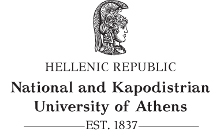Doctoral Dissertation in progress
«Terrorism as a Hybrid Threat: The Case of Islamic Terrorism»
Commencement date: May 28, 2024
Abstract
The thesis examines the cooperation of State Actors (SA) and Non-State Actors (NSA) (specifically islamic terrorist organizations) in achieving their strategic goals using islamic terrorism as a hybrid means.
Terrorism has been systematically studied for decades and the study of hybrid threats is constantly developing, however terrorism and hybrid threats have not been studied together. In other words, islamic terrorism has not been examined in the context of hybrid threats.
The present study will demonstrate that the choice of malicious state actors to cooperate with islamic terrorist organizations, using terrorism as a hybrid means, is systematically carried out in order for the SA to advance their goals (primarily through undermining or/and harming their opponents, without substantial attribution and at a price less than the benefit, or/and as a secondary benefit of the hybrid terrorist action).
In particular, it will be attempted to answer the following research questions:
- Why, under what conditions, and for what reasons, do specific SA cooperate with other NSA, using islamic terrorism as a hybrid means, in order to achieve their goals?
- When and why is this choice successful?
In order to investigate the above research questions, systematic case studies will be carried out, in which the cooperation of SA and NSA is documented, based on specific criteria, for the use of islamic terrorism as a means of hybrid threats, with results that are evaluated as successful.
The case studies are: Iran and Hezbollah, Iran and Palestinian Islamic Jihad (PIJ), Iran and Hamas, Pakistan and Lashkar-e-Taiba (LeT), Pakistan and Jaish-eMohammed (JeM)
Through systematic case studies and relevant literature, this research aims to develop a "middle-range theory" that explains the causes and conditions under which SA and NSA collaborate to increase their chances of achieving their strategic goals, using islamic terrorism as a hybrid means.
